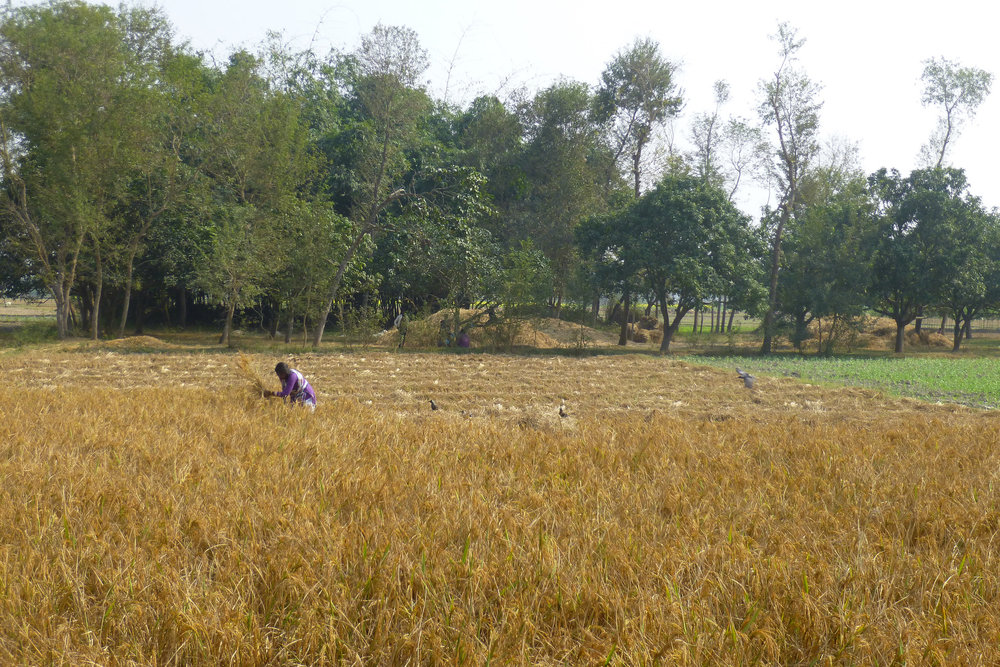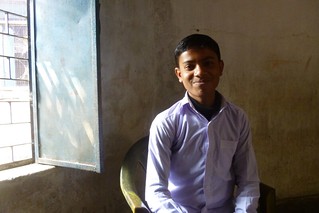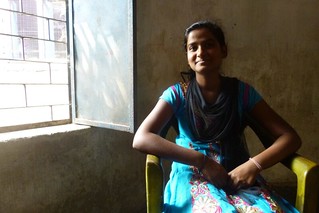Choosing school
By Sarah K. | South Asia

Many kids in rural South Asia are sent to work in the fields when they're young. Parents don't see education as a valuable investment for their kids if they're to be simple farmers in the future. Photo by Sarah K.
Ashish’s father is a farmer, as was his grandfather, and their grandfathers before that. Even as farming becomes less likely to sustain a family, Ashish and his parents planned on him becoming a farmer, too. That’s why, after Ashish finished the second grade, his parents pulled him out of school to help with the field work.
Sachhi left school after the third grade for the same reason. “What would a girl do with education?” Sacchi’s parents reasoned. “Reading and writing aren’t required for housework.”
In addition, once girls passed the lower grades, there was nowhere close by for them to study. The closest high school was several hours away — too far for a daughter of any respectable family to travel alone.
Nearly everyone in Ashish and Sachhi’s village thought the same way. Families rarely sent their girls to school, and only families who could afford to lose a pair of field work hands sent their sons. The local school was sparsely attended and suffered from a lack of vision for its students.
Chetna's arrival
Then Chetna, a ministry of the Emmanual Hospital Association and partner with SIM, arrived in the area. As they settled there, they began chatting with the headmaster and residents of the neighboring three villages. As Chetna does its community health and development work, it surveys villages and finds ways for communities to solve their own problems. Chetna staff began encouraging parents to send their kids to school, pointing out the benefits of educating their daughters as well as their sons. This sort of thinking was new to the villagers, and it took a while for them to decide.
Slowly, parents began pulling their sons from the field and sending them back to school. Daughters emerged from the kitchen and dug out their old school books. Soon there were more young people who were going to school than not. The local school gained momentum and excitement with all the new students – hiring new teachers as their enrollment swelled to five hundred children.
Now, all of Ashish’s friends — all the boys from his neighborhood — attend school. Sachhi still knows girls who aren’t coming to school, even though she’s now studying in seventh grade and loves math. The grades below her, though, are full of girls — they even outnumber the boys in one classroom! Ashish and Sachhi both say they plan on becoming doctors, turning down the corners of their mouths at the suggestion of an “easier” profession.
Sachhi’s father is excited his daughter is studying, “She’ll be a big person one day,” he tells anyone who’ll listen.
Pray for:
• Chetna and SIM partners as they work among the rural farmers of Southeast Asia to help people gain a better education and develop community health,and consider giving to projects like these at SIM.
• the gospel to go out among these rural communities and that many will turn to Christ.
Want to use your healthcare or education background as a missionary for Christ? Contact SIM today to find out how you can serve and support God's global mission.
Related stories

Doro Clinic outreach programmes reach the forgotten with care and the gospel
In South Sudan’s Maban County, medical teams from SIM’s Doro Clinic are reaching refugees who can’t reach them, bringing healing, hope and the gospel to the sick, the stigmatised and the overlooked.

Today for Tomorrow is rooting the next generation in Christ across Southern Africa
Today for Tomorrow began with just five children when SIM mission worker Graham, Jessie and Chris Maphosa saw a gap in how children were being discipled. While serving in Zimbabwe, Chris and colleagues developed the T4T training programme to help pastors and teachers share Christ-centered lessons in ways children could understand. Today, the ministry has grown significantly and continues to shine across the region.

Our call to care for the planet goes beyond recycling: lessons on creation stewardship
As a child growing up in Canada, I thought recycling was the best way to help the planet. The world’s problems were much too big for us as children, but finally, there was something we could do as well, right from our home. But my understanding of all my efforts were turned on its head when I chatted with Ian Ratcliff, SIM's Ministry Point Person for Creation Stewardship and Care.

